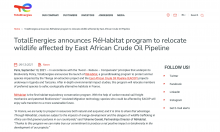TotalEnergies announces RéHabitat program to relocate wildlife affected by East African Crude Oil Pipeline
Paris, September 13, 2021 — In accordance with the “Avoid – Reduce – Compensate” principles that underpin its Biodiversity Policy, TotalEnergies announces the launch of RéHabitat, a groundbreaking program to protect animal species impacted by the Tilenga oil extraction project and the East African Crude Oil Pipeline (EACOP) projects underway in Uganda and Tanzania. After in-depth environmental impact studies, this program will relocate members of preferred species to safer, ecologically alternative habitats in France.
RéHabitat is the first habitat-equivalency conservation program. With the help of carbon-neutral sail freight mechanics and patented Biodiversion™ Assisted Migration technology, species who could be affected by EACOP will enjoy safe transition to a more sustainable future.
“In France, we are lucky to prosper in resources both natural and acquired, and it is time to share that advantage. Through RéHabitat, creatures subject to the impacts of energy development and the dangers of wildlife trafficking in Africa can find greener pastures in our countryside,” said Yohanne Gavalé, Partnerships Director of RéHabitat. “Thanks to this program we can make true our commitment to produce a net positive impact on biodiversity in the development of our projects.”
In accordance with international best practices, TotalEnergies is working with leading wildlife ecologists and the French Ministry of Ecology to determine “sister habitats” in France that adequately approximate original habitats along the EACOP route and allow for viewing by the French public. A third-party assessment determines survival viability and probability of procreative success for each species. RéHabitat has also been approved by relevant environmental authorities in Uganda and Tanzania.
Representative fecund pairs of important animals—like the African Elephant, a keystone species, as well as the Nubian Giraffe, hippopotamus, and the very endangered Shoebill Stork—are then transported aboard the SV RéHabitat, a wind and sun-powered cargo vessel refitted to transport a diversity of species comfortably. Following ground transport on the French mainland, ecology experts then oversee the successful acclimation of species in their new homes.
The Tilenga and EACOP projects take into account the environmental stakes posed not only to animals, but as well to humans. To mark TotalEnergies’ commitment to developing a sustainable energy future, the company is mobilising substantial resources to establish new employment and habitat options for those who reside or subsist on land in the path of the pipeline. RéHabitat will employ residents who choose relocation to work aboard the SV RéHabitat as sanitation specialists, transitional habitat maintenance crew, and wildlife morale monitors.
The RéHabitat program was introduced at the IUCN Conservation Congress last week in Marseille. It was announced publicly today in Paris for members of the press, including a demonstration ceremony welcoming an East African silvery-cheeked hornbill to its new home.
“We acknowledge that EACOP represents significant social and environmental stakes, which we are seriously taking into consideration. We believe this innovative program will greatly benefit the animals involved, create alternative employment opportunities locally, and additionally provide delight to the French people,” said Patrick Pouyanné, Chairman and Chief Executive Officer of TotalEnergies.
